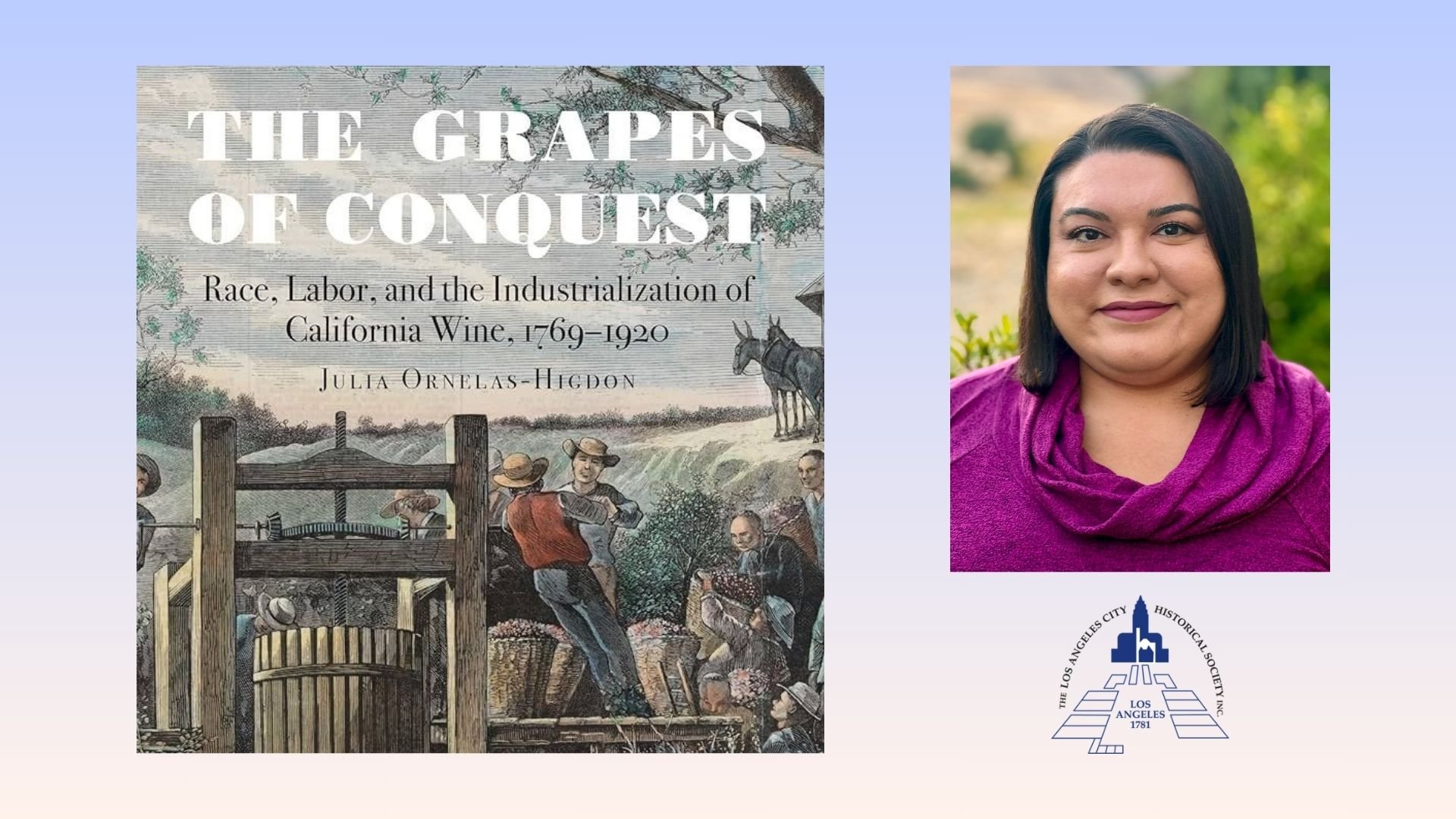Join us Sunday, April 7th, 2024, at 2 p.m. at the Mark Taper Auditorium in the Central Library.
The second lecture in the 2024 Marie Northrop Lecture Series will be a discussion with author Dr. Julia Ornelas-Higdon on her latest book, “The Grapes of Conquest: Race, Labor, and the Industrialization of California Wine, 1769-1920” (University of Nebraska Press).
“The Grapes of Conquest” explores California’s 19th century wine industry as a site of conquest and racialization. (More details below.)
Book signing after presentation.
Location
This lecture series is co-sponsored by Los Angeles City Historical Society and the History Department of the Richard J. Riordan Central Library. Lectures are held in the Mark Taper Auditorium, on the first floor of the Central Library, 630 W. 5th Street, Los Angeles. For ADA accommodations, call (213) 228-7430 at least 72 hours prior to event.
Parking
The library garage is located on the east side of Flower Street, just south of 5th Street. Flower Street is one-way, south. Parking is $1 from 1:00-5:00 with a library card. (Anyone arriving too early or choosing to stay in the garage past 5:00-5:15 would be charged $8.00 for the day.)
About the Book
California’s wine country conjures images of pastoral vineyards and cellars lined with oak barrels. As a mainstay of the state’s economy, California wines occupy the popular imagination like never before and drive tourism in famous viticultural regions across the state. Scholars know remarkably little, however, about the history of the wine industry and the diverse groups who built it. In fact, contemporary stereotypes belie how the state’s commercial wine industry was born amid social turmoil and racialized violence in eighteenth- and nineteenth-century California.
In "The Grapes of Conquest," Julia Ornelas-Higdon addresses these gaps in the historical narrative and popular imagination. Beginning with the industry’s inception at the California missions, Ornelas-Higdon examines the evolution of wine growing across three distinct political regimes—Spanish, Mexican, and American—through the industry’s demise after Prohibition. This interethnic study of race and labor in California examines how California Natives, Mexican Californios, Chinese immigrants, and Euro-Americans came together to build the industry. Ornelas-Higdon identifies the birth of the wine industry as a significant missing piece of California history—one that reshapes scholars’ understandings of how conquest played out, how race and citizenship were constructed, and how agribusiness emerged across the region. The Grapes of Conquest unearths the working-class, multiracial roots of the California wine industry, challenging its contemporary identity as the purview of elite populations.
About Dr. Julia Ornelas
Dr. Julia Ornelas-Higdon is an Associate Professor of History at California State University, Channel Islands. Her research and teaching focus on the intersections of race, agriculture, and labor histories, and she is a past recipient of a Faculty Fellowship from the National Endowment for the Humanities. Her book, The Grapes of Conquest: Race, Labor, and the Industrialization of California Wine, 1769-1920, explores California’s 19th century wine industry as a site of conquest and racialization. Dr. Ornelas-Higdon is also the proud granddaughter of two Braceros, whose experiences as transnational laborers inspired her research.
About the Marie Northrop Lecture Series
In 1992, the Los Angeles City Historical Society president Patricia Bowie and board member Michael Engh, reflected on how the LACHS could promote greater interest in Los Angeles history among its members and the general public. The two – both professors of history at Loyola Marymount University – decided on an annual program of three lectures to be delivered by established writers, historians, and educators.
LACHS decided to name the lecture series in memory of Marie Northrop, a longtime member of LACHS and widely respected genealogist who had specialized in tracing the lineage of early settlers of the original El Pueblo de Nuestra Senora la Reina de Los Angeles.





